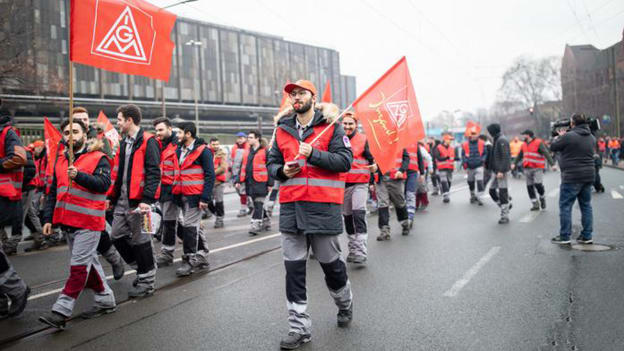Thyssenkrupp steelworkers in Germany protest against job cuts

Thousands of Thyssenkrupp workers have now come together to protest against these job cuts. 6,000 workers gathered at Thyssenkrupp's Steel Europe headquarters in Duisburg to let out their anger and highlight their concern. The steelworkers urge the German manufacturer to preserve jobs and invest more to give the steel unit a better chance in a challenging environment.
The employees protesting were armed with flares, flags and whistles in IG Metall's red-and-white colours. The workers have highlighted that they need fresh money instead of cost cutting programs that have been going for a while now.
While Thyssenkrupp shared it would flesh out its plan for the steel unit in coming weeks and has committed to ploughing 570 Mn euros (S$862 Mn) a year into the division, labor representatives demand three times as much.
Determined to make their voices heard, the workers have planned another demonstration on Wednesday at Thysenkrupp's parent company headquarters in Essen that also oversees its elevator division.
Thyssenkrupp’s financial struggle & CEO Martina Merz’s attempt to save it
A failed merger bid with Tata steel, hard competition in a market closely dictated by global economic trends, cheaper pricing by foreign rivals, and environmental regulations hit Thyssenkrupp’s operations and business badly.
When Martina Merz took over as CEO a few months back she had a lot on her plate to deal with, as the company struggled. Since then her focus has been on finding efficiencies, cut debt, get rid of struggling units, and find new partners.
In a bid to improve the company’s performance, Merz announced organizational restructuring and operational revamp. Then came the news to to list or sell its elevator division and the possibility to sell majority stakes in its struggling car parts and plant engineering divisions.
While announcing these developments, Merz had then said, “It is true that this will not be possible without significant job cuts. This is about strengthening businesses and improving performance. This is not a sellout.”
But all these decisions that may or may not benefit the business in the long run to sustain business are impacting several employees negatively.
2019 has seen many such cases of the workforce bearing the cost of management’s or companies’ failed strategies and poor decisions. Jet Airways, Indian international airline based in Mumbai, India which, on 17 April 2019, suspended all flight operations, leaving many jobless. Then many banks across the globe announced nearly 60,000 job cuts as revenue declined throughout the sector. The thought that scares everyone is, if with the current global economic slowdown more job losses are to follow.
Image credit: picture-alliance/dpa/M.Kusch

















